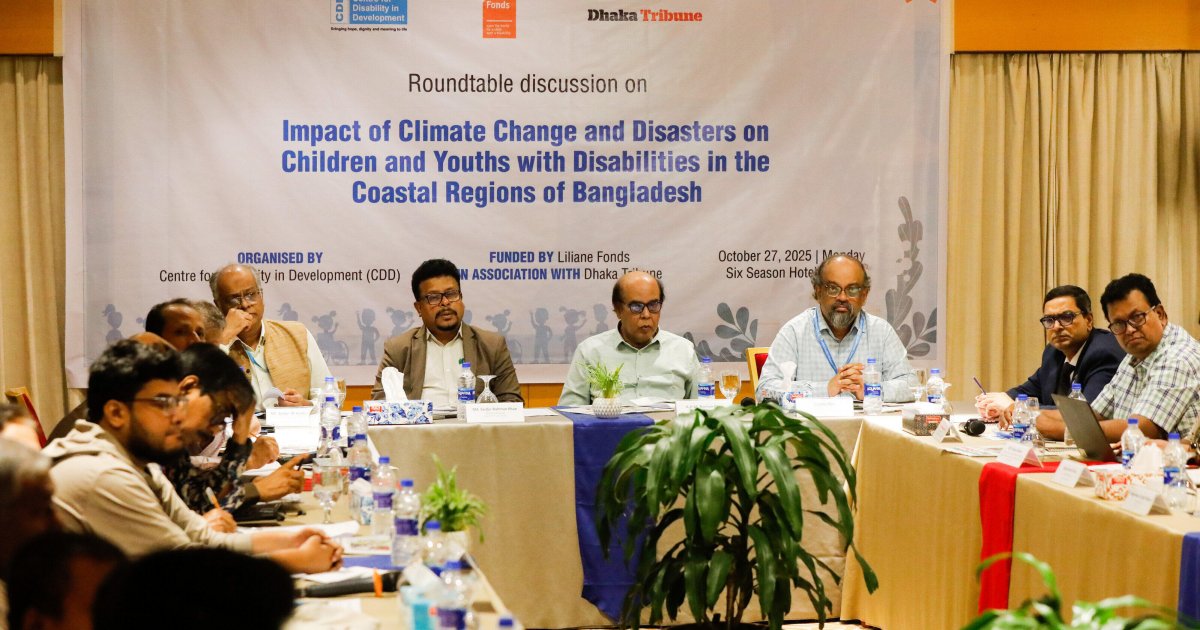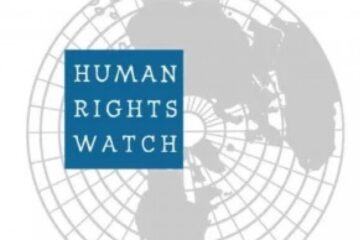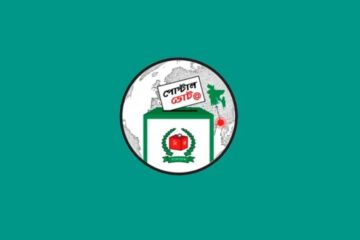Children and youths with disabilities living in Bangladesh’s coastal regions are disproportionately exposed to the impacts of climate change, with worsening disasters deepening existing inequalities.
The research, “Impact of Climate Change on Children and Youths with Disabilities,” conducted by the Centre for Disability in Development (CDD) in two climate-vulnerable sub-districts, Patharghata in Barguna and Assasuni in Satkhira, surveyed 300 individuals aged 6 to 25 and found that 93% believe extreme weather events and climate variability have worsened over the past five years.
Four in five respondents said persons with disabilities are more severely affected than other vulnerable groups.
Riverbank erosion, salinity intrusion, cyclones, and flooding were reported as persistent threats disrupting access to healthcare, education, mobility, and livelihoods.
The economic toll is stark.
Nearly half of the surveyed households live below the poverty line, while families spend an additional Tk3,800 to Tk4,100 per month on disability-related care.
Many are forced to take out loans to meet basic needs.
The study also uncovered widespread exclusion during emergencies: 80% of respondents said they were not prioritized for evacuation, while 57% reported discrimination in accessing relief.
Although 87% of children and youth with disabilities require regular healthcare, only 20% are able to access it.
One-third have never attended school.
In the report, lead researcher Md Tanvir Hasan recommended adopting disability-inclusive disaster risk reduction and climate adaptation strategies that emphasize disaggregated data, accessible services, livelihood support, inclusive early warning systems, and the active participation of youth in decision-making processes.
“Climate change is not just a future threat—it is a constant and disruptive reality,” the report stated. “If inclusion is ignored, the most vulnerable will continue to be left behind.”
A young participant from the community said: “I’ve never seen any NGO involve children or youth with disabilities in disaster preparedness activities.”
Nazmul Bari, the Executive Director of CDD remarked that persons with disabilities are two to four times more likely to die than the general population. He further informed that the research findings will contribute in program design and policy advocacy.
Speaking virtually from the Netherlands, Jan Apperloo of Liliane Fonds emphasized the need for family-centered preparedness and economic empowerment.
“Inclusion isn’t optional—it’s essential,” he said.
“Focus on family participation, preparedness, and economic innovation.”
Md Saidur Rahman Khan, Director General of the Department of Social Services (DSS), acknowledged the findings and highlighted the government’s response.
“Children and youths with disabilities face challenges during and after disasters. We must work together to address these challenges,” he said.
He noted that the DSS is running 54 programs for vulnerable populations, reaching a large population of Bangladesh.
This year’s national budget allocates Tk3,752 crore for persons with disabilities, including increased monthly allowances and targeted support for students.
MA Akher, Joint Secretary of the Department of Youth Development, expressed his appreciation for those behind the initiative, saying: “I have learned, observed, and listened. My sincere thanks to everyone who made this opportunity possible. We are eager to be part of this work. Please guide us on what steps we need to take.”
He added: “Currently, we are implementing a major project with financial support from the World Bank. The initiative will cover 250 upazilas, including coastal regions. I am hopeful that this effort will yield meaningful results.”
National WASH Cluster Coordinator of Unicef, Mst Saleha Khatun, pointed to the lack of accessible water, sanitation, and hygiene infrastructure in rural areas.
“We’ve developed inclusive WASH facilities with government partners. Inclusion requires collective responsibility.”
Dr Mohammed Moniruzzaman Khan, Associate Professor and Director of the Institute of Disaster Management and Vulnerability Studies, added: “No one is born marginalized—it’s society that excludes them. Inclusion must become a movement.”
Assistant Resident Representative of UNDP, Bangladesh, Sarder M Asaduzzaman stressed the need to separate climate and disaster risks in policymaking.
“We must rethink intervention design. Inclusion is not a favor—it’s a right.”
The session, chaired by AHM Noman Khan, Advisor of CDD, ended with a unified call for cross-sector collaboration to ensure no child or youth with a disability is left behind in Bangladesh’s climate response.



